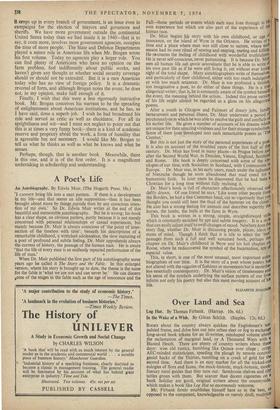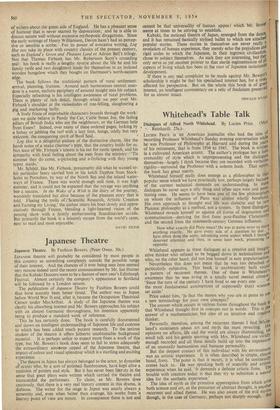Over Land and Sea
Log Hut. By Thomas Firbank. (Harrap. 10s. 6d.) In the Wake of a Wish. By Goran Schildt. (Staples. 12s. 6d.) Boom about the country always quicken the Englishman's tall' palsied frame, and drive him out into urban sleet or fog to exchangi long-saved book tokens for an ill-written, misshaped volume about the reclamation of marginal land, or A Thousand Ways with a Blasted Heath. There are plenty of country writers about the* days: wise old rustics, bumbling like Quince over silage ; crisPr AEC-minded statisticians, speeding the plough by remote control: genial hacks of the Thirties, tumbling on a crock of gold for thl second time. And there is an eAsy market for all the tricked-ow eulogies of flora and fauna, the mock-historic, mock-botanic, mock' literary rural guides that they turn out: farmhouse shelves and 60' -tables groan with them. But scarcer than decent cigarettes on bank holiday are good, original writers about the countryside. which makes a book like Log Hut so enormously welcome. Mr. Firbank firmly establishes himself here as in the best, as opposed to the competent, knowledgeable or merely droll, tradi0011 of writers about the green side of England. He has a pleasant sense of humour that is never marred by deprecation; and he is able to discuss nature well without excessive mythopoeic divagations. Since the early writings of Henry Williamson, Devon hasn't had so percep- tive or sensible a scribe. For its power of evocative writing, Log Hut can take its place with country classics of the present century, such as England's Green and Pleasant Land or Adrian Bell's trilogy. Not that Thomas Firbank has Mr. Robertson Scott's crusading zeal: his book is really a lengthy reverie about the life he and his family (wife and two daughters) made for themselves in an isolated wooden bungalow which they bought on Dartmoor's north-eastern edge.
The book follows the traditional pattern of rural settlement: arrival, planning, fruition. Around each harmonious central anec- dote is a warm, realistic periphery of assured insight into his subject. Especially refreshing is his intelligent awareness of rural problems. There is plenty of rich detail, through which we peer over Mr. Firbank's shoulder at the vicissitudes of tree-felling, slaughtering a pig and marketing holly.
A lively frieze of improbable characters bounds through the work: can we quite believe in Pandy the Cat, Cable Street Joe, the fading pillars of British India who are the neighbours, or the German help from Essen? Indeed, over many of these ordered pages, lurking by a linhay or jabbing the turf with a lazy foot, hangs, oddly but very welcome, the conquering spirit of Basil Seal. •
Log Hut is a delightful picture of the distinctive charm, like the harsh notes of a snake charmer's pipe, that the country holds for us. Not least of Mr. Firbank's talents is his car for rustic speech, and his sympathy with local feeling about the men from the ministry : "Tis summer they do come, a-picnicing and a-frolicing with they young typist maids.'
Mr. Schildt, like Mr. Firbank, presumably did what he wanted to: his particular fancy carried him in his ketch Daphne from Stock- holm to Portofino, by way of the North Sea and the inland water- ways of France. There was world enough anti time, it was high summer, and it could not be expected that the voyage was anything but- a success. In the Wake of a Wish is the diary of the journey, woodenly translated but alive because of the pleasant story that is told. Fleeing the trolls of ,' Scientific Research, Artistic Creation and Earning my Living,' the author steers his boat slowly and appre- ciatively through France, blending a light-hearted vision of the passing show with a faintly embarrassing Scandinavian accidle. But primarily the book is a leisurely escape from the world's cares, easy to read and most enjoyable.
DAVID STONB



































































 Previous page
Previous page